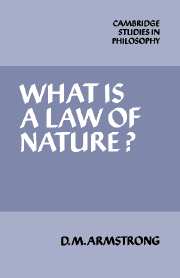Book contents
- Frontmatter
- Contents
- Acknowledgements
- PART I A critique of the Regularity theory
- PART II Laws of nature as relations between universals
- 6 Laws of nature as relations between universals
- 7 Functional laws
- 8 Uninstantiated laws
- 9 Probabilistic laws
- 10 Further considerations concerning the form of laws
- 11 Are the laws of nature necessary or contingent?
- Conclusions
- Works cited
- Index
9 - Probabilistic laws
Published online by Cambridge University Press: 05 June 2012
- Frontmatter
- Contents
- Acknowledgements
- PART I A critique of the Regularity theory
- PART II Laws of nature as relations between universals
- 6 Laws of nature as relations between universals
- 7 Functional laws
- 8 Uninstantiated laws
- 9 Probabilistic laws
- 10 Further considerations concerning the form of laws
- 11 Are the laws of nature necessary or contingent?
- Conclusions
- Works cited
- Index
Summary
THE FORM OF PROBABILISTIC LAWS
In the last two chapters we gave an account of functional laws as higher-order laws, that is, laws governing laws. We also proposed a (non-Realist) account of uninstantiated laws. Our next task is to try to bring irreducibly probabilistic laws within our scheme.
At first sight there appears to be some difficulty in this undertaking. Suppose it to be a law that Fs are Gs, and suppose that a is F. We then have:
(1) (N(F,G)) (a's being F, a's being G)
where N(F,G) is a necessitation relation holding between the two states of affairs, a's being F and a's being G, a necessitation holding in virtue of the two universals involved in the two states of affairs.
Suppose, however, that the law which links F and G is irreducibly probabilistic. There is a probability P(1 > P > O) that an F is a G. Suppose, again, that a is F. It would be simple and elegant to analyse the situation in just the same way as in the case of the deterministic law:
(1) ((Pr:P) (F,G)) (a's being F, a's being G)
where ((Pr:P) (F,G)) gives the objective probability of an F being a G, a probability holding in virtue of the universals F and G.
But, of course, there is an obvious difficulty. Because the law is only probabilistic, the state of affairs, a's being F, may not be accompanied by the state of affairs, a's being G. The ‘relation’ ((Pr:P) (F,G)) will then lack its second term.
- Type
- Chapter
- Information
- What is a Law of Nature? , pp. 128 - 136Publisher: Cambridge University PressPrint publication year: 1983

